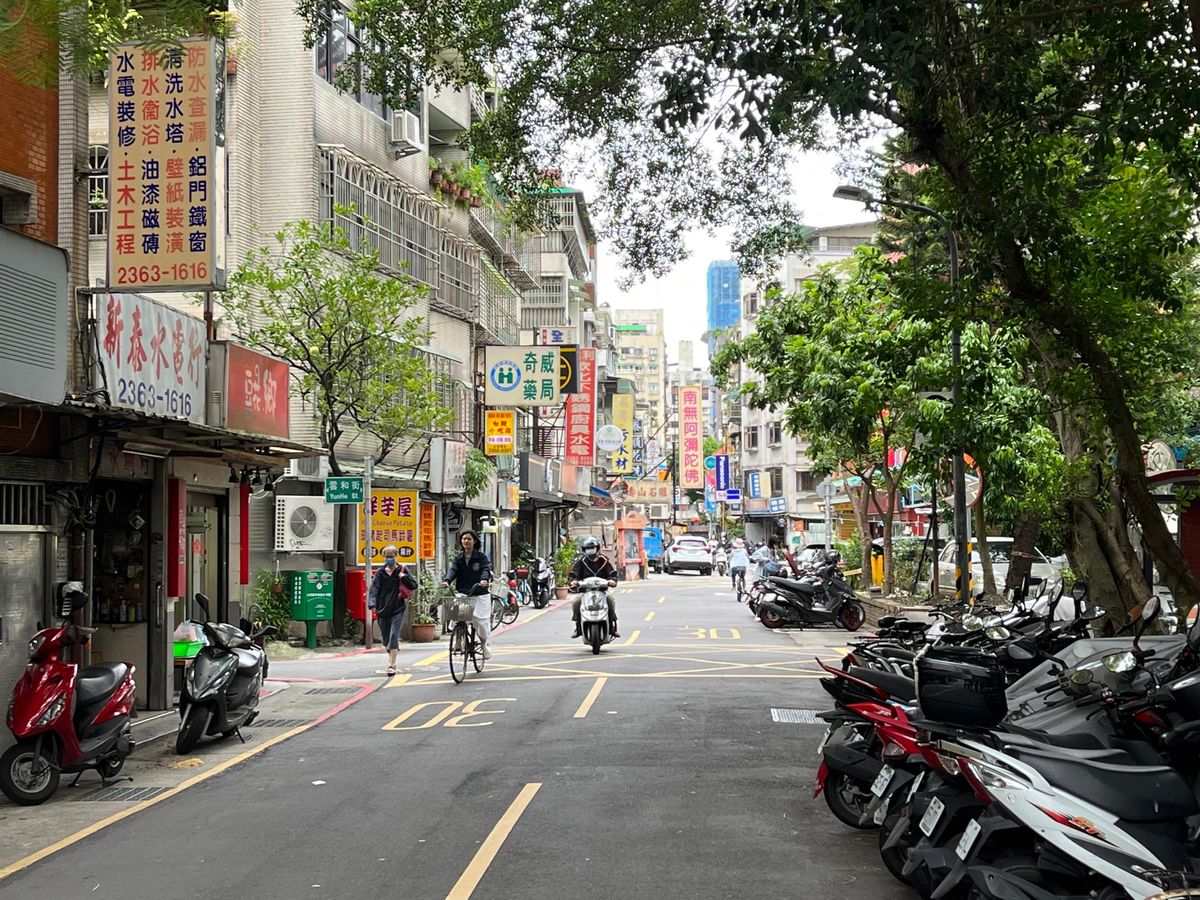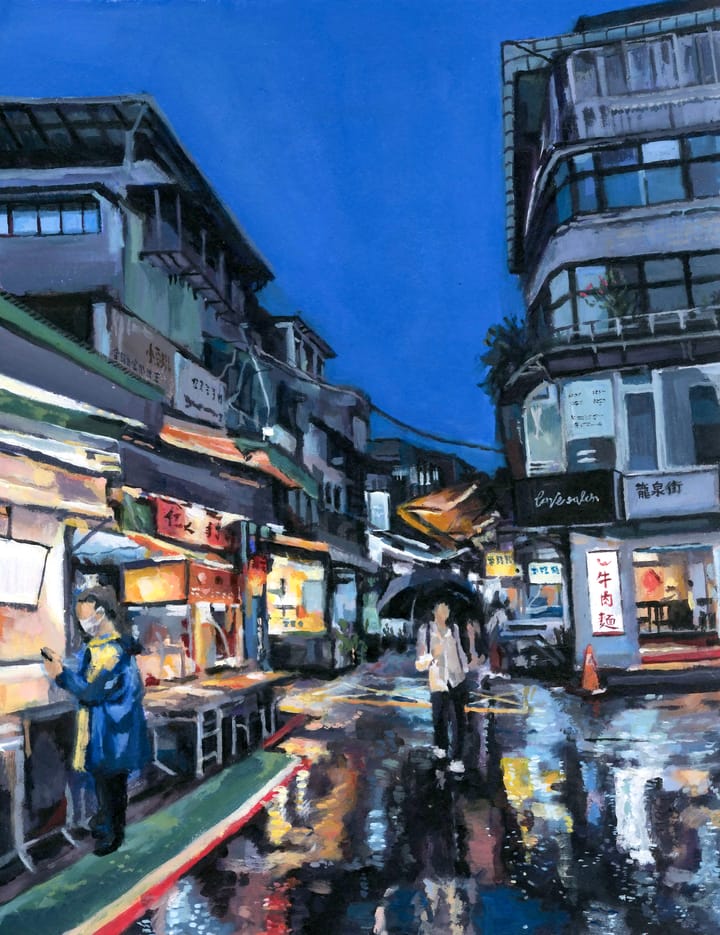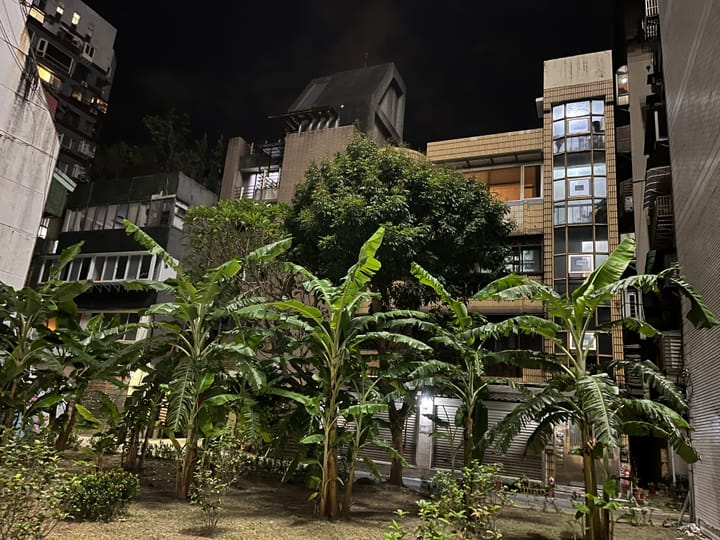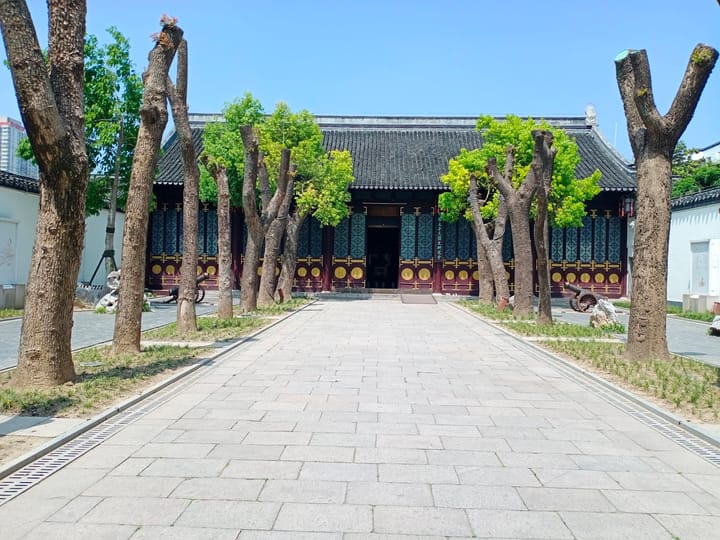#4 When We Think About Distant Cities
My experience of Taipei still feels like that of a tourist even as I return again and again to familiar places with the eye of a local.

I have a longer newsletter for you all today in an effort to make up for skipping my regular publication time last week. Expect some Halloween vibes, Taiwanese basketball, and a more serious discussion of the various terrible news events happening in our world.
But first, Halloween!
In the run-up to Halloween in Taiwan (where my housemate and I went as Spongebob and Patrick; nope, sorry, all pictures are lost to history), I stumbled across "The Witch," a poem by Elizabeth Willis. When I read poems nowadays, I mostly lock on to a word or phrase that, for some reason, just lodges itself into my brain. Reading this one, I stopped at these few lines:
At times a witch will seem to struggle against an unknown force
stronger than herself.
She will know things she has not seen with her eyes. She will have
opinions about distant cities.
A witch may cry out sharply at the sight of a known criminal dying of
thirst.
She finds it difficult to overcome the sadness of the last war.
If there is such a thing as "witchy behavior," I assume even the least hospitable judge in Salem would eliminate "having opinions about distant cities" as a cause for concern. There is nothing subversive about that line, which makes it register as even more powerful.
Maybe I am a particularly receptive audience because my whole life right now can be summed up as: "having opinions about distant cities." As a foreigner living in Taipei, I feel invested in the city's people and its future while feeling somewhat removed from them. I can speak Mandarin (haltingly and often with haphazard pronunciation), but conversations with locals can seem stilted, if not more than a bit inauthentic. As I played pickup basketball with a few Taiwanese guys last week, I found my vocabulary reduced to little more than the score and "好球 hǎo qiú" (nice shot).
My experience of Taipei still feels like that of a tourist even as I return again and again to familiar places with the eye of a local. This "distant city" no longer feels quite as distant, though as a foreigner, I'm not sure that feeling of "being in and outside" of the city's pulse ever goes away.
As I continue writing this newsletter, I'm excited to see when—and if—that feeling changes!
Chinese Learning Corner
I recently have been reading a lot of work by Simon Leys, the pseudonym for Belgian scholar Pierre Ryckmans, who was a rare voice among his generation of China watchers in the West to denounce the excesses of Mao Zedong's Cultural Revolution. He also wrote some lively pieces about China's view of the past and the writer George Orwell, who clearly informed his own views of totalitarianism and authoritarian leaders.
The piece I was left ruminating on all week was not even by Leys, but his protégé Geremie Barmé, who described his first series of Chinese language lessons with Leys as well as the connections Leys made between several, basic Chinese characters. In his essay, which Barmé organizes around characters any first-semester Chinese student knows (我 wǒ,你 nǐ,高 gāo,etc.), he includes a wonderful anecdote about Guǎn Dàoshēng 管道昇, the wife of calligrapher Zhào Mèngfǔ 趙孟頫 during the Yuan Dynasty. When she learned of Zhao's plans to take a concubine, Guan wrote the following:
Surely was never so loving a pair!
For the potter took clay
And he fashioned a me
And modelled a you:
Then, when the whim took him,
He smashed both the ures
And set to again:
Kneaded and worked the clay,
Fashioned another me,
Modelled another you:
So that, you see,
My body is partly you
And you are partly me.
我儂兩個忒煞情多!
譬如將一塊泥
捏一個你
塑一個我:
忽然間歡喜啊,
將他來都打破
重新下手:
再團再煉,
再捏一個你,
再塑一個我:
那期間那期間,
我身子裡有你也
你身子裡也有了我。
I find myself drawn to those last two lines, which are more basic than most ancient Chinese poetry I've read while still maintaining an awesome power:
我身子裡有你也 Wǒ shēnzi lǐ yǒu nǐ yě
你身子裡也有了我。Nǐ shēnzi lǐ yě yǒu le wǒ.
An odd postscript to this story: Xi Jinping apparently referenced this poem in 2019 during a speech in Russia (!) in which he called Donald Trump a "friend" (!!) and said the economic ties between China and the United States could be described using those last two lines: "I am in you, and you are in me." (!!!)
Eeeeek.
Odds and Ends:
1.
I've struggled with whether to write this following section, not because I lack things to say, but because I'm not sure whether my voice is really needed. While at Mother Jones, I wrote a bit about the debate within the Democratic Party over Israel and Palestine, but that debate (while interesting) strikes me as far less important than the pure, human tragedy of this past month: more than 1,400 people dead in Israel and thousands more in Gaza. (If you're curious about how journalists report on death tolls in conflict zones, I found this Washington Post piece very insightful. In short: always be skeptical as few sources are able to be completely reliable in a war zone. Try to lean on independent organizations that have multiple sources for their data.)
I don't begrudge anyone for seeking out some lighter stories, but if you have the space and inclination to read more about this conflict, I recommend these few pieces I read recently. They all approach Israel and Palestine from differing angles and reflect the biases/perspectives of their authors, but I found them all instructive in their own way:
- "We Cannot Cross Until We Carry Each Other" by Jewish Currents editor-in-chief Arielle Angel.
- "In the Cities of Killing" by the New Yorker's David Remnick.
- "Gaza’s shock attack has terrified Israelis. It should also unveil the context" by +972 Magazine's Haggai Matar
- "Despite what you think, Palestinians are not celebrating death" by Palestinian American writer Hebh Jamal
If any of you have read a piece that stayed with you amid this terrible crisis, please let me know. I'd love to hear from you and better understand your perspective.
2.
Some music I've loved lately:
- Taylor Swift's new version of "Clean" — those last 30 seconds hit different!
- "But I Like You" by BOYNEXTDOOR
- "Winterbreak" by MUNA and "Scott Street" by Phoebe Bridgers — two sad songs for when you really just want to stay in your feelings; I recommend chasing these with a Taiwanese pineapple cake or, if all else fails, some Cheez-Its
- "苦茶子" by Starling8
3.
Let the record show: Taiwanese basketball games are fun!
This past weekend, my housemates and I saw the defending champion New Taipei New Taipei CTBC DEA (that name really rolls off the tongue!) play the Tainan TSG GhostHawks in a thrilling game that New Taipei ultimately won with a second-half scoring barrage. The arena in New Taipei was not completely full, which was a bummer for the season opener, but the people who were there brought A+ vibes. Even when New Taipei could not make an outside shot for what felt like a huge chunk of the first half, the crowd (many of them families with young kids) kept cheering either "Zhōngxìn tègōng!" 中信特攻 (the team's Chinese name) or "fángshǒu!" 防守 (defense).
One fun moment: during breaks in the game, as the cheerleaders were trying to throw tied-up team posters into the crowd, there were so many kids crowding them that, eventually, the cheerleaders gave up and started just handing them out.
On a nerdier note: my goodness, Tainan's big men need to show a little effort. Yikes. For long stretches of the game, they held the clear height advantage over the quicker, more active New Taipei players, but would just loiter far from the basket and fail to contest any rebounds. (They should take a page out of my favorite basketball team's playbook and simply wait until the second round of the playoffs to stop showing effort!)
Expect far more basketball content in this space as my housemates and I already have plans to see Jeremy Lin and his New Taipei Kings play soon in Taiwan's other professional league.
Have a wonderful week, everyone! I'll be back in your inbox in two weeks.


